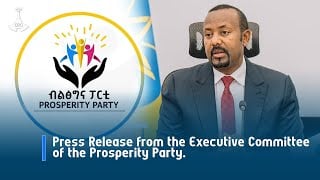 Abel Eshetu
Abel Eshetu
The recently released 2025 U.S. Department of State Investment Climate Statement is not merely a technical document; it reads like a mirror reflecting the failures of Ethiopia’s current rulers. It is a stark account of how a nation once celebrated for its promise has been dragged into instability, corruption, and economic collapse. The very words of the report expose what the Ethiopian people live with daily: a system that destroys trust, erodes rights, and chases away opportunity.
Ethiopia should be an attractive destination for investment. With a population of more than 135 million, most of them young and eager for work, the country ought to be thriving. Instead, the report warns investors of widespread insecurity, broken property rights, and arbitrary governance. Conflicts in Amhara and Oromia continue to rage, displacing more than 4.2 million people, while instability in Tigray lingers. Businesses are forced to shut down or are expropriated by armed groups or government officials. Families are uprooted, communities shattered, and the economy left paralyzed. This is not a climate for investment; it is a climate of fear.
The so-called “corridor development” projects provide perhaps the clearest example of the regime’s reckless policies. Tens of thousands of residents and business owners, including foreign companies, have been expelled overnight with little to no warning or compensation. Bulldozers rolled in at gunpoint, demolishing livelihoods in the name of modernization. The report documents these acts not as isolated events but as a pattern—an unmistakable sign that property rights in Ethiopia are fragile, conditional, and easily violated. No serious investor can trust a government that treats both citizens and foreign partners in this way.
On the economic front, the picture is no better. The much-touted floating of the birr in 2024 was supposed to bring stability. Instead, it triggered massive depreciation, widening again the gap between the official and black-market rates. The regime’s inability to manage foreign exchange has left businesses stranded and ordinary people struggling to afford basic goods. The final humiliation came with Ethiopia’s default on international debt and its downgrade to junk status by global credit agencies—a verdict that underscores just how far the economy has sunk under Prosperity Party rule.
The report is equally blunt about corruption, describing it as a “national security threat.” This is not the language of routine criticism; it is an acknowledgement that corruption in Ethiopia has become a system of governance. Major contracts are awarded without competition, tax offices target businesses with arbitrary penalties, and new laws give authorities sweeping powers to seize assets without due process. In practice, this means investors are robbed under the cover of law, while insiders connected to the ruling party enrich themselves.
The crisis of governance goes beyond the economy. Political space has narrowed dangerously. Opposition parties are harassed, blocked from organizing, and their leaders often imprisoned. Journalists face censorship and intimidation. The much-heralded National Dialogue has lost credibility, with key groups boycotting it as a stage-managed exercise. Civic life is shrinking at the very moment the country needs openness and reconciliation. The report confirms what Ethiopians feel every day: there can be no lasting investment without stability, and there can be no stability without freedom.
International partners must take note. The United States, the European Union, the IMF, and the World Bank cannot continue pouring money into a regime that bulldozes homes, jails its critics, and defaults on its debts. Every dollar of aid and every line of credit should be tied to real reforms: respect for property rights, genuine political dialogue, fiscal transparency, and an end to corruption as the foundation of power. To do otherwise is to bankroll destruction while pretending to support development.
The 2025 Investment Climate Statement is clear in its message: Ethiopia is not failing because its people lack talent or because its land lacks resources. It is failing because the regime in power has turned opportunity into ruin, prosperity into plunder, and hope into junk. Until there is accountable leadership committed to rule of law and democratic governance, Ethiopia will remain a country of squandered potential, where investors flee and citizens suffer.
